SN2016gxp observée au T60, au Pic du Midi
-
Michel Verlinden
- Posts: 191
- Joined: Tue Aug 16, 2016 12:11 am
SN2016gxp observée au T60, au Pic du Midi
Bonjour les spectroscopistes,
En mission au Pic du Midi, Jean-Paul Godard et moi-même avons réalisé dans la nuit du 28 au 29 octobre un spectre de la supernova SN2016gxp avec l'Alpy 600 de Shelyak, et un guidage ST4 sur le MCMT du T60 (Camera de guidage: Atik Titan; camera science: Atik 460EX).
SN2016gxp est apparue dans la galaxie NGC51, à 240 millions d'années lumières de notre système solaire. Le profil est celui d'une supernova de type Ia. Vos commentaires sont les bienvenus.
En mission au Pic du Midi, Jean-Paul Godard et moi-même avons réalisé dans la nuit du 28 au 29 octobre un spectre de la supernova SN2016gxp avec l'Alpy 600 de Shelyak, et un guidage ST4 sur le MCMT du T60 (Camera de guidage: Atik Titan; camera science: Atik 460EX).
SN2016gxp est apparue dans la galaxie NGC51, à 240 millions d'années lumières de notre système solaire. Le profil est celui d'une supernova de type Ia. Vos commentaires sont les bienvenus.
-
Robin Leadbeater
- Posts: 1957
- Joined: Mon Sep 26, 2011 4:41 pm
- Contact:
Re: SN2016gxp observée au T60, au Pic du Midi
Very nice ! I envy your big telescope on a mountain  Here is my spectrum 5 days earlier (blue) to compare with yours (red). We can see some changes in the last 5 days.
Here is my spectrum 5 days earlier (blue) to compare with yours (red). We can see some changes in the last 5 days.
Cheers
Robin
Cheers
Robin
- Attachments
-
- _at2016gxp_20161023_824_leadbeater.png (11.52 KiB) Viewed 9207 times
LHIRES III #29 ATIK314 ALPY 600/200 ATIK428 Star Analyser 100/200 C11 EQ6
http://www.threehillsobservatory.co.uk
http://www.threehillsobservatory.co.uk
-
Paolo Berardi
- Posts: 578
- Joined: Thu Sep 29, 2011 10:51 pm
Re: SN2016gxp observée au T60, au Pic du Midi
Hi Michel, Robin, all.
I share my observation for the night 29-30 october with Lhires III 150 l/mm and C9.25 telescope.
First of all, congratulations for your observations and the fantastic classification by Robin when the SN was very, very faint!
After a cold front passage the sky was very clear but there was a strong atmospheric turbulence (I had to integrate a lot).
Slit view through the Lodestar camera:
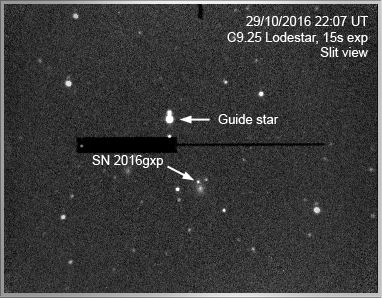
Simultaneous photometry with a small telescope (Mak90, SHV-H9, photometric V filter) returns a V mag ~ 15.0 (not an easy task for me due to host galaxy shaded glow).
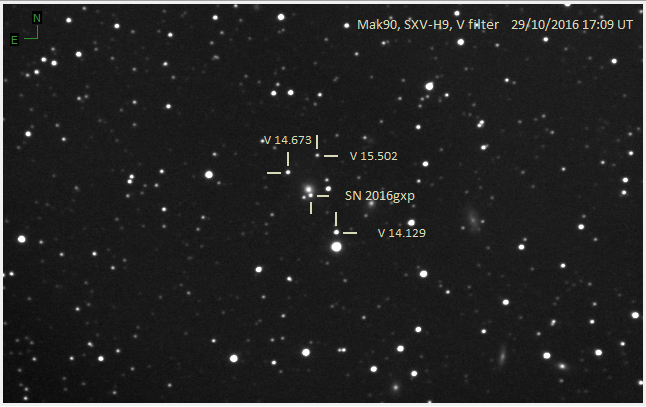
Absolute flux calibrated profile from V mag:
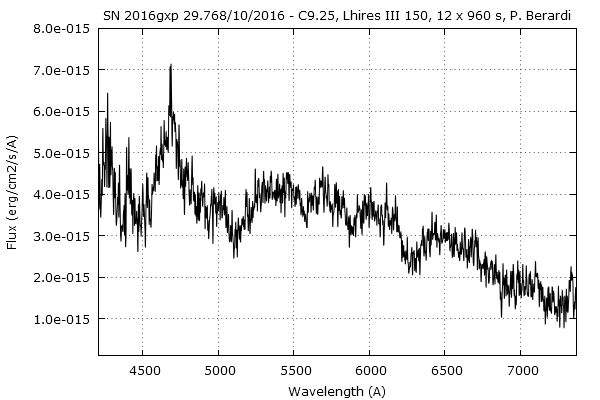
From the filtered profile I measured the main Si II absorption line minimum at ~6270A:
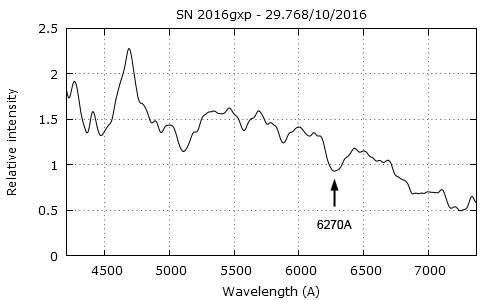
corresponding to about 9500 Km/s expansion speed of the gaseous shell (I considered the galaxy recession speed, 5351 Km/s).
Michel, by comparing our spectra there is a big general shift (your is blueshifted relative to mine). That seems to me a really big change for one day. From some past SN observations, I saw that velocities decrease with time. So, the minimum of Si II absorption should move towards red wavelengths. For example (Malcolm Locke work):
download/file.php?id=1399
But instead, the comparison shown by Robin suggests its opposite. Perhaps a peculiar SN behaviour? We were wrong the WL calibration? What do you think?
I attach my FITS profile:
http://quasar.teoth.it/html/spectra/sn2 ... 29_768.zip
Clear sky!
Paolo
I share my observation for the night 29-30 october with Lhires III 150 l/mm and C9.25 telescope.
First of all, congratulations for your observations and the fantastic classification by Robin when the SN was very, very faint!
After a cold front passage the sky was very clear but there was a strong atmospheric turbulence (I had to integrate a lot).
Slit view through the Lodestar camera:

Simultaneous photometry with a small telescope (Mak90, SHV-H9, photometric V filter) returns a V mag ~ 15.0 (not an easy task for me due to host galaxy shaded glow).

Absolute flux calibrated profile from V mag:

From the filtered profile I measured the main Si II absorption line minimum at ~6270A:

corresponding to about 9500 Km/s expansion speed of the gaseous shell (I considered the galaxy recession speed, 5351 Km/s).
Michel, by comparing our spectra there is a big general shift (your is blueshifted relative to mine). That seems to me a really big change for one day. From some past SN observations, I saw that velocities decrease with time. So, the minimum of Si II absorption should move towards red wavelengths. For example (Malcolm Locke work):
download/file.php?id=1399
But instead, the comparison shown by Robin suggests its opposite. Perhaps a peculiar SN behaviour? We were wrong the WL calibration? What do you think?
I attach my FITS profile:
http://quasar.teoth.it/html/spectra/sn2 ... 29_768.zip
Clear sky!
Paolo
-
Robin Leadbeater
- Posts: 1957
- Joined: Mon Sep 26, 2011 4:41 pm
- Contact:
Re: SN2016gxp observée au T60, au Pic du Midi
Hi Paolo, Michel,
I agree that there could be a wavelength calibration problem. Here is a comparison of our three spectra(filtered). Mine (Green) and Paolo's (Blue) agree in wavelength but Michel's (Red) only agreed when I applied a 40A red shift.
Cheers
Robin
Edited to correct direction of shift
I agree that there could be a wavelength calibration problem. Here is a comparison of our three spectra(filtered). Mine (Green) and Paolo's (Blue) agree in wavelength but Michel's (Red) only agreed when I applied a 40A red shift.
Cheers
Robin
Edited to correct direction of shift
- Attachments
-
- sn2016gxp_comparison.png (30.96 KiB) Viewed 9174 times
LHIRES III #29 ATIK314 ALPY 600/200 ATIK428 Star Analyser 100/200 C11 EQ6
http://www.threehillsobservatory.co.uk
http://www.threehillsobservatory.co.uk
-
Michel Verlinden
- Posts: 191
- Joined: Tue Aug 16, 2016 12:11 am
Re: SN2016gxp observée au T60, au Pic du Midi
Hi Paolo, Robin,
I agree with the calibration's mistake, I calibrated my spectrum with an A0V star (no calibration lamp), it's not precise but Paolo showed us the dispersion is right.
I will calibrate it with a Neon Argon lamp too.
Best Regards,
Michel
I agree with the calibration's mistake, I calibrated my spectrum with an A0V star (no calibration lamp), it's not precise but Paolo showed us the dispersion is right.
I will calibrate it with a Neon Argon lamp too.
Best Regards,
Michel
-
Robin Leadbeater
- Posts: 1957
- Joined: Mon Sep 26, 2011 4:41 pm
- Contact:
Re: SN2016gxp observée au T60, au Pic du Midi
Hello Michel,
Using the Balmer lines usually gives a good calibration. Do you use ISIS? Did you set the reference position to 0,0 when you calibrated the SNe spectrum?
http://www.astrosurf.com/buil/isis/guid ... g_fr14.png
from this page
http://www.astrosurf.com/buil/isis/guid ... ration.htm
(This is something I forget to do sometimes and it can give unpredictable results)
Cheers
Robin
Using the Balmer lines usually gives a good calibration. Do you use ISIS? Did you set the reference position to 0,0 when you calibrated the SNe spectrum?
http://www.astrosurf.com/buil/isis/guid ... g_fr14.png
from this page
http://www.astrosurf.com/buil/isis/guid ... ration.htm
(This is something I forget to do sometimes and it can give unpredictable results)
Cheers
Robin
LHIRES III #29 ATIK314 ALPY 600/200 ATIK428 Star Analyser 100/200 C11 EQ6
http://www.threehillsobservatory.co.uk
http://www.threehillsobservatory.co.uk
-
etienne bertrand
- Posts: 1041
- Joined: Mon Aug 31, 2015 11:26 am
Re: SN2016gxp observée au T60, au Pic du Midi
Hello,
Bravo pour les manips !
Paolo comment fais tu pour filtrer ton plot ? ça fait vraiment propre.
Bravo pour les manips !
Paolo comment fais tu pour filtrer ton plot ? ça fait vraiment propre.
-
Michel Verlinden
- Posts: 191
- Joined: Tue Aug 16, 2016 12:11 am
Re: SN2016gxp observée au T60, au Pic du Midi
Hello Paolo, Robin,
You are right, Robin, I did'nt set the reference position to 0,0.
I joign a better profil, but RMS is now 5A instead of 40A. Paolo, would you mind if you compare the three spectra please ?
Cheers !
You are right, Robin, I did'nt set the reference position to 0,0.
I joign a better profil, but RMS is now 5A instead of 40A. Paolo, would you mind if you compare the three spectra please ?
Cheers !
-
Paolo Berardi
- Posts: 578
- Joined: Thu Sep 29, 2011 10:51 pm
Re: SN2016gxp observée au T60, au Pic du Midi
Hi all!
Michel, it seems ok now. This is a profile comparison with mine (I do not have the Robin spectral profile), plotted with the new application PlotSpectra by Tim Lester:
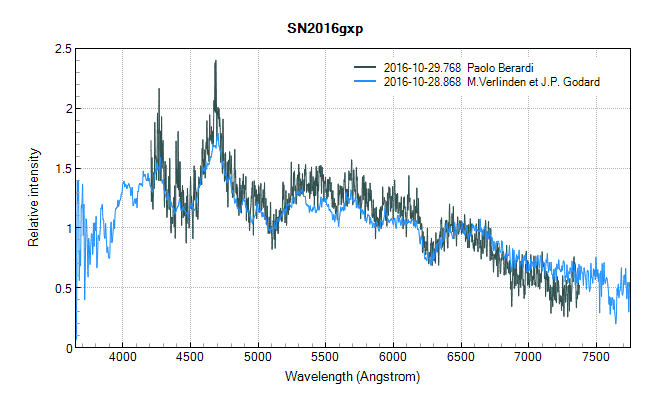
Etienne, I used a Gaussian filter (button Filter in ISIS profile window or Operations, Gaussian filter from VSpec menu) with a parameter about 20. Supernovae spectra have very broadened lines (except narrow lines that in some cases appear, formed in external regions), so you can convert the "extra-resolution" into SNR.
Paolo
Michel, it seems ok now. This is a profile comparison with mine (I do not have the Robin spectral profile), plotted with the new application PlotSpectra by Tim Lester:

Etienne, I used a Gaussian filter (button Filter in ISIS profile window or Operations, Gaussian filter from VSpec menu) with a parameter about 20. Supernovae spectra have very broadened lines (except narrow lines that in some cases appear, formed in external regions), so you can convert the "extra-resolution" into SNR.
Paolo
-
Michel Verlinden
- Posts: 191
- Joined: Tue Aug 16, 2016 12:11 am
Re: SN2016gxp observée au T60, au Pic du Midi
Hi Paolo,
I thank you for the comparaison and Tim for Plotspectra, a nice tool !
Michel
I thank you for the comparaison and Tim for Plotspectra, a nice tool !
Michel